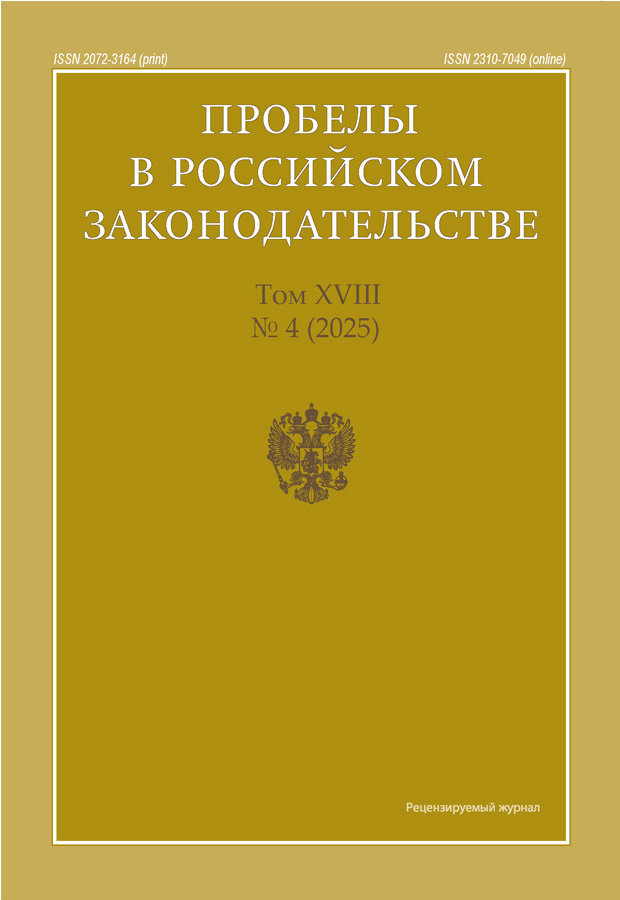О конкурсном контроле в контексте тенденций развития несостоятельности (банкротства) предприятий
- Авторы: Беликова К.М.1
-
Учреждения:
- ФГАОУ ВО «Московский государственный юридический университет имени О.Е. Кутафина (МГЮА)»
- Выпуск: Том 18, № 4 (2025)
- Страницы: 83-96
- Раздел: Частно-правовые (цивилистические) науки
- URL: https://journals.eco-vector.com/2072-3164/article/view/689377
- DOI: https://doi.org/10.33693/2072-3164-2025-18-4-83-96
- EDN: https://elibrary.ru/DCEBSG
- ID: 689377
Цитировать
Аннотация
Автор статьи на примере положений ФЗ № 127-ФЗ «О несостоятельности (банкротстве)», Законопроекта № 1172553-7, положений зарубежных законодательств (Франции, США), доктрины и судебной практики обращается к рассмотрению конкурсного контроля в контексте тенденций развития несостоятельности (банкротства) предприятий. Попутно предметом авторского внимания становится корпоративный контроль, в том числе—в процедурах банкротства. Автор исходит из субъективно-объективной заданности мира. В работе использован диалектический метод, иные обще- и частно-научные методы (сравнительно-правовой, исторический, анализ, синтез и др.). Результатом работы является в числе прочего вывод о том, что продебиторский подход в банкротстве, ориентированный на спасение бизнеса должника, а не только на удовлетворение требований кредиторов, отголоски которого мы время от времени наблюдаем в решениях судов требует, по нашему мнению, кардинального переосмысления классического понимания конкурсного контроля и роли арбитражного управляющего и других участников процедур несостоятельности (банкротства): приоритеты конкурсного контроля следует сместить с кредитороцентристкой модели, в которой главная цель—это максимальное и быстрое удовлетворение требований кредиторов, часто через ликвидацию, а конкурсный контроль—инструмент давления и защиты от должника,—на модель баланса интересов, в которой конкурсный контроль должен стать инструментом достижения такого баланса; требуется трансформация роли арбитражного управляющего с кредиторов», когда арбитражный управляющий видится, прежде всего, как агент собрания кредиторов, исполняющий волю этого собрания по максимизации текущих выплат, тем самым его задача сводится к инвентаризации имущества, его оценке и продаже,—на понимание АУ как «кризисного менеджера / реструктуризатора»; необходимы: 1) пересмотр полномочий арбитражного управляющего, когда он сильно ограничен в инициативах по спасению бизнеса без одобрения собрания кредиторов в сторону их расширения и 2) смещение «зоны риска» АУ, где главный риск последнего—недовольство кредиторов недостаточными выплатами, 3) повышение роли суда и др. Показаны примеры применения такого подхода на практике. Рекомендованы изменения в законодательство на основе в том числе зарубежного опыта.
Полный текст
Об авторах
Ксения Михайловна Беликова
ФГАОУ ВО «Московский государственный юридический университет имени О.Е. Кутафина (МГЮА)»
Автор, ответственный за переписку.
Email: KMBelikova@msal.ru
ORCID iD: 0000-0001-8068-1616
SPIN-код: 2541-3498
д-р юрид. наук, профессор, профессор кафедры предпринимательского и корпоративного права
Россия, МоскваСписок литературы
- Шершеневич Г.Ф. Конкурсный процесс. 3-е изд. М.: Статут, 2021 С. 101 (477 с.).
- Болтовский В.М. Конкурсный контроль: как правовая категория института несостоятельности (банкротства). // Вестник арбитражной практики. 2024 № 4. С. 84–90.
- Телюкина М.В. Основы конкурсного права. М. 2004 С. 77–82.
- Рукинов М.В. Анализ феномена банкротства с позиций теории экономической безопасности. // Известия Санкт-Петербургского государственного экономического университета. 2019 № 1 (115). С. 23–27.
- Корпоративное право: Учебный курс. В 2 т. Т. 2 / отв. ред. И.С. Шиткина. М.: Статут, 2018. 990 c.
- Шиткин А.О. Понятие и основания возникновения корпоративного контроля // Хозяйство и право. 2020. № 5. С. 104–121.
- Кулагин М.И. Государственно-монополистический капитализм и юридическое лицо. М.: Статут, 2004. 363 c.
- Лаптев В.А. Директивная модель управления корпорациями с участием государства в сфере оборонно-промышленного комплекса. // Правоприменение. 2023 Т. 7. № 4. С. 136–145. doi: 10.52468/2542-1514.2023.7(4).136-145.
- Покровский И.А. История римского права / И.А. Покровский. Москва: Статут: Консультант плюс, 2004 (ОАО Яросл. полигр. комб.). 538 с. URL: https://civil.consultant.ru/elib/books/25/page_21.html?ysclid=mciworqb1q490698807 (дата обращения: 20.05.2025)
- Суворов Е.Д. Осуществление корпоративных прав при банкротстве корпорации. // Экономическое правосудие на дальнем востоке России. 2021–4 (23). С. 27–34.
- Беликова К.М. Чат-боты и ИИ-агенты в процедурах банкротства. // Современный юрист. 2025 № 2. (51). С. 119–132.
- Беликова К.М. Злоупотребление доминирующим положением в законодательстве, доктрине и правоприменительной практике Европейского Союза и стран Южноамериканского общего рынка -Аргентины, Бразилии и Перу. // Право и политика. 2006 № 7 С. 38–52.
- Ершова И.В., Енькова Е.Е. Банкротство: законодательная модель и правоприменительная практика. // Lex Russica. 2016 № 8 (117). C. 178–207. doi: 10.17803/1729-5920.2016.117.8.178-207.
- Aliya Sandra Dewi, Yuhelson, Dewi Anggraeni. (2024). The Existence of a Stay Period in Bankruptcy That Begins with Postponement of Debt Payment Obligations (PKPU). International Journal of Scientific Multidisciplinary Research, 2(6), 615–628. https://doi.org/10.55927/ijsmr.v2i6.9920 URL: https://journal.formosapublisher.org/index.php/ijsmr/article/view/9920 (дата обращения: 20.05.2025)
- Corporate Restructuring: Lessons from Experience / Michael, Pomerleano and William, Shaw (eds.). The World Bank, Washington, 2005. p. 130 (436 p.). URL: https://openknowledge.worldbank.org/server/api/core/bitstreams/4a61a5ff-d581–5a40-b58b-57e415ab17cb/content (дата обращения: 20.05.2025.)
- Морхат П.М. К вопросу о концепции банкротного права в российской юрисдикции // Предпринимательское право. 2024. № 1. С. 10-17.
Дополнительные файлы









